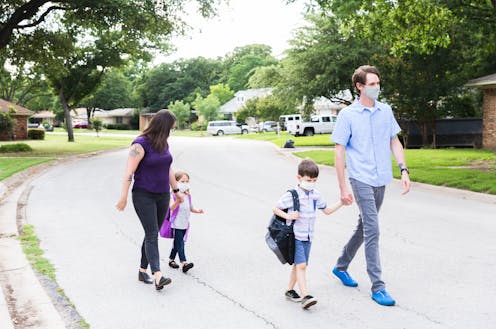Parents tend to choose their children's schools based on their own educational experience
- Written by Anna Rhodes, Assistant Professor of Sociology, Rice University

The Research Brief[1] is a short take about interesting academic work.
The big idea
Faced with a growing number of options[2] for where to enroll their children in school, parents quickly narrow their choices[3] based on their own educational experience as students.
That’s what we found for a study published in March 2023 in Social Currents.
Historically, parents have turned to their social networks[4] and materials produced by school districts[5] to help them choose a school for their children.
However, when we analyzed interviews with a diverse sample of 60 parents from the Dallas metropolitan area, we found that about one-third of them used their own experiences in school to narrow their options before they gathered other information about schools.
If parents had a positive educational experience as children, they frequently narrowed their options to the same type of school that they attended, whether that be a private, magnet or traditional public school. Their hope was to replicate this positive experience for their kids. For example, Janice, a Black mother of two, explained, “They’re in private school mainly because I went to private school.”
Although parents of all backgrounds and income levels used this strategy, it was most common among white parents, who typically enrolled their children in private or suburban public schools, which they attended themselves. We refer to this as “experience-motivated replication.”
Virginia, a white mother of two, explained that her husband, John, “just assumed our kids are going to public schools” because the suburban schools he attended were such “wonderful public schools.” To replicate John’s experience the couple was in the process of leaving the city to buy a home in the suburbs.
Similarly, Rachel, a white mother of three, quickly narrowed her school options to consider only private Catholic schools because of her own positive experience. Rachel’s husband told us: “The kids go to the same private Catholic school that she went to.”
In contrast, we find that when parents had negative educational experiences, they typically sought to avoid enrolling their children in the type of school they attended, eliminating those schools from consideration. This strategy, which we call “experience-motivated avoidance,” was common among Black parents in our sample who felt underserved in city public schools as children.
For instance, Toni, a Black mother of three, shared: “I went to a public school and I don’t think that the teachers really care about the kids’ education. That’s me personally. I didn’t get that one on one.” Based on this negative experience, she did not consider their zoned Dallas public school. Instead, Toni focused on charter school options for her children. She ultimately enrolled them in a charter school near her home.
Why it matters
Where families decide to enroll their children in school not only influences the educational resources available to their child, but also shapes broader patterns of racial and socioeconomic segregation in America’s schools.
The school selection process plays a key role in how educational inequalities span generations, especially when white parents rely on their own experiences to inform the choices they make for their children.
For example, when white families move out of the city to enroll their children in suburban public schools, or consider only private schools like those they attended, these choices replicate historic patterns of white flight. It also helps explain why white families tend to be overrepresented in private schools[7] and suburban public schools.
Conversely, when we examine how parents’ negative experiences as students influence which schools they consider for their children, it may help us to better understand why, for instance, Black and Latino families[8] increasingly choose charter schools.
What still isn’t known
While this study shines light on one key aspect of how parents choose schools for their children, we believe it is important to understand all of the ways parents choose schools. Examining the choice process for diverse populations of families in districts where school choice is available can reveal the full set of strategies parents rely on to select schools.
References
- ^ Research Brief (theconversation.com)
- ^ growing number of options (nces.ed.gov)
- ^ parents quickly narrow their choices (doi.org)
- ^ social networks (doi.org)
- ^ materials produced by school districts (doi.org)
- ^ Jose Luis Pelaez Inc via Getty Images (www.gettyimages.com)
- ^ private schools (civilrightsproject.ucla.edu)
- ^ Black and Latino families (data.publiccharters.org)
Authors: Anna Rhodes, Assistant Professor of Sociology, Rice University

